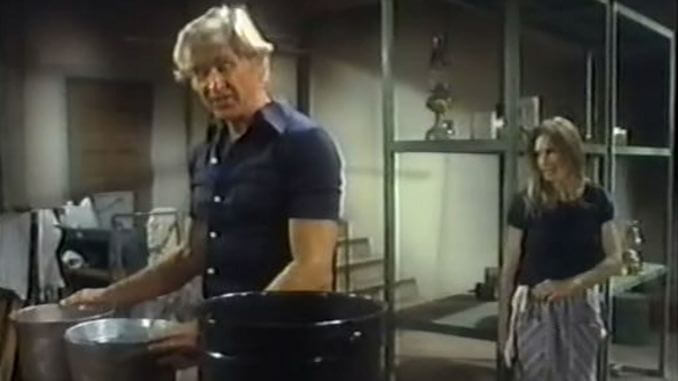Haunts of the Very Rich Condensed the Existential Catastrophe of Lost into 73 Wild Minutes

From 1969 to 1975, ABC put out weekly films. They functioned as TV pilots, testing grounds for up-and-coming filmmakers, and places for new and old stars to shine. Every month, Chloe Walker revisits one of these movies. This is Movie of the Week (of the Month).
Although most editions of the ABC Movie of the Week are available to watch on YouTube, the state of their visual quality is a crapshoot. There are pleasant surprises, but more often, the image is at least a little fuzzy. Sometimes it’s so bad that it’s hard to discern one person-shaped splodge from another. While Haunts of the Very Rich falls on the worse side of that spectrum, it’s also one of the rare cases in which a hazy picture adds to the experience of a film, rather than detracts from it. As the action quite literally heats up later on in the movie, the cloudy image reads like steam on the lens; the blurriness of it all adds to the woozy, nightmarish quality. Haunts of the Very Rich exists on the queasy 3 A.M. plane of reality where you can’t tell if you’ve woken up or are still trapped in your subconscious.
We open in a private plane, ferrying seven strangers towards a mysterious location called The Portals of Eden—no-one even knows which country it’s in, only that it’s purported to satisfy the every whim of its monied clientele. The venue takes that secrecy extremely seriously: The airplane windows are painted black, and the flight attendant rebuffs all the passengers’ attempts to extract information.
They arrive at The Portals of Eden and, at first, the passengers are indeed impressed with the luxurious resort. Soon, things start going wrong. A snake is found in the bed of the group’s honeymooners. A ferocious storm knocks out the hotel’s electricity. The water supply depletes, the food spoils, the staff flee. What at first looked like heaven begins to very much seem like… well…
If you haven’t worked out that the guests of The Portals of Eden have died by the time the opening credits have rolled, then you just aren’t paying attention—and you certainly haven’t seen Outward Bound (1930) or Between Two Worlds (1944), from which Haunts of the Very Rich borrows liberally. That this central mystery is so easy to guess so early on might have been disappointing, but Paul Wendkos’ richly evocative Movie of the Week has more going for it than a “twist.”
That cast, for one thing. Welcoming the group to the resort is the formidable Moses Gunn as the enigmatic manager, Seacrist. Though Seacrist presents a convincing façade of hospitality, there’s a quiet menace to his serenity; as the guests get more and more agitated, and he remains resolutely unruffled, he starts to appear downright demonic.
-

-

-

-

-

-

-

-

-

-

-

-

-

-

-

-

-

-

-

-

-

-

-

-

-

-

-

-

-

-

-

-

-

-

-

-

-

-

-

-








































